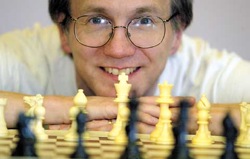Today the New York Times Numberplay blog features a card game that I co-invented, along with a mathematical problem: What is the best strategy?
Here are the rules for “Stern-Mackenzie One-Round War.”
The game requires three people, one of whom serves only as the dealer. The dealer has a deck of 2N cards numbered one through 2N. She shuffles the cards and then deals N cards to each player, making sure, as she deals the cards, to place them in order from highest to lowest (she can look at the cards as she’s dealing them without the players seeing their values).
Cards are then put face-down into the middle of the table. Player 1 plays a card, without turning it over; then player 2 plays a card, without turning it over. Play continues in the same way until all the cards have been paired up. Only then do the players turn over all the cards, revealing who has won each battle (highest card in each pair wins). The player who wins the most battles wins the game.
That’s the game. The cool thing about it is that it might seem at first glance that there is no conceivable strategy, because neither player gets any information about the other player’s cards until the “big reveal” at the end. But in fact, the second player has a huge advantage because he always knows the ranking of the played card in his opponent’s hand. He may not know what the card is, but even knowing its ranking gives him information of a sort. But how does he use that information, when he doesn’t even know his own cards? Hmm?
Some of you might recognize this as a variant of a problem I have posted about here before. In that version it was about two chess clubs that are going to play a match, #1 player against #1 and #2 against #2 and so on, and the question is whether one team can gain an advantage by putting its players in the wrong order. (We assume there is no Elo rating system to detect such shenanigans!)
After some discussion with Gary Antonick, who writes the “Numberplay” blog, I rephrased it as a card problem, basically to take care of one problem. If you’re actually talking about games between chess players, upsets can happen, and that may affect your strategy. In the card-game version, the higher card always beats the lower card, no questions asked. That simplifies the problem (which is nevertheless very deep, very fascinating, and not at all simple!) Perhaps even more important than simplifying the problem, it really crystallizes what the problem is about.
Anyway, I think the coolest thing about this blog post is that Gary Hewitt has programmed a computer applet to play “Stern-Mackenzie One-Round War” online. It is so cool to actually play this game that until now I have only been able to think about in the abstract. In fact, even though I know the right strategy, it’s fun to play the wrong strategy and see what happens!
I hope you’ll check out the “Numberplay” post and keep on checking it during the week, because I believe Gary Hewitt is going to roll out some enhancements to the applet as the week goes by. I’m not 100 percent sure how that is going to work, so I’ll be curious, too.



{ 2 comments… read them below or add one }
Cool. Reminds me of non-transitive dice, and gerrymandering.
Hi Ashish,
This game would definitely work for a hustler. The hustler explains the rules to the sucker and says, “I’ll be really nice and let you go first.” To the sucker it looks like a fair game, so why not? After a while the sucker might realize that the second player has an advantage, and he might insist on going second half the time. At that point it really becomes a fair game, but the hustler will still probably win more than 50 percent of the tricks because he knows the optimal strategy and the sucker doesn’t.